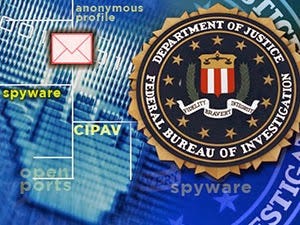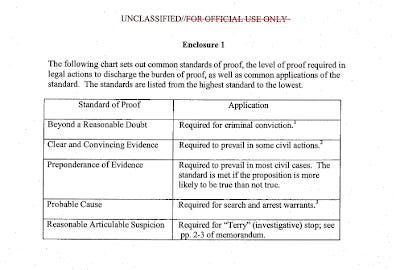The FBI is doing much of the NSA's spying, wants it kept secret

A few folks have been trying to remind everyone that the FBI is heavily involved in all of this and, in many ways, has an equally bad if not worse record in abusing the rights of Americans. Many of the programs discussed were to retrieve information by the FBI or the NSA, and it turns out that the FBI often does much of the dirty work for the NSA, including interfacing with various companies to get access to data. We'd mentioned recently how the FBI was pushing tech companies to install "port readers" at both telco and tech companies (though, many tech firms were resisting), and also that the FBI had been ramping up their use of malware.
Shane Harris, over at Foreign Policy has a nice profile on the FBI's Data Intercept Technology Unit, or DITU, who handles most of this work. It repeats the story of the port readers, but adds how the DITU is often the unit that works with tech companies and then passes info along to the NSA -- so some companies don't even realize they're dealing with the NSA, believing it's just via the FBI (not that this would make things any better). It also notes that the DITU tends to be made up of a lot of ex-telco guys who know very specifically how the telco networks work, something that at least some people at the telcos may be uncomfortable with the government knowing (though, again, the telcos seem much more willing to open up to the government than the tech companies).
It's an interesting profile all around, but at the end it gets even more interesting, as an ex-law enforcement source that Harris talks to highlights that without investigating what the DITU is up to, Congress' exploration of what's going on will be very incomplete.
The former law enforcement official said Holder and Mueller should have offered testimony and explained how the FBI works with the NSA. He was concerned by reports that the NSA had not been adhering to its own minimization procedures, which the Justice Department and the FBI review and vouch for when submitting requests to the Foreign Intelligence Surveillance Court.
"Where they hadn't done what was represented to the court, that's unforgivable. That's where I got sick to my stomach," the former law enforcement official said. "The government's position is, we go to the court, apply the law -- it's all approved. That makes for a good story until you find out what was approved wasn't actually what was done."
http://www.techdirt.com/articles/20131125/02515925349/how-fbi-actually-does-much-nsas-spying-is-keeping-that-quiet.shtml
NSA’s ‘Reasonable Articulable Suspicion’ gives them the right to spy on anyone:

The NSA has collected our email address books from most major webmail websites. (for more info. click here.)
The Electric Frontier Foundation (EFF) has published a chart of primary source documents compiled from newspapers and the government regarding the NSA and the recent domestic spying scandals.In these documents, there is a treasure trove of disturbing information. The NSA's top secret course on “Reasonable Articulable Suspicion” (RAS). What is RAS? RAS is the standard by which the NSA deems you to be someone they can spy on because of your alleged relation or connection to someone they regard as a threat. On page four of 17, the RAS is defined as follows: An identifier will meet the Reasonable Articulable Suspicion Standard if based on the factual and practical considerations of everyday life on which reasonable and prudent persons act, there are facts giving rise to a reasonable articulable suspicion that the identifier is associated with one of the specified Foreign Powers. Let us address the absolutely bizarre and dubious standard. This is completely up to interpretation, which was done purposely, with the intent of legitimizing almost any search of a U.S. citizen’s electronic communications. This is a dangerous precedent that could make anyone a potential threat due to ambiguous standards and definitions. In fact, on another leaked document (see page 8 here) the Office of Deputy General Counsel for the NSA describes RAS as the lowest standard of proof needed to investigate an individual. Note that the standard [RAS]does not present a particularly high hurdle. The level of evidence demanded by the standard is considerably less than proof by a preponderance of the evidence, meaning that here one need not show it is likely than not that a number is associated with [REDACTED list of Foreign Powers.
http://endthelie.com/2013/11/21/the-nsas-reasonable-articulable-suspicion-legitimizes-surveillance-of-just-about-anyone/#axzz2llMCkhaT
NSA targeted Microsoft like Google and Yahoo:
http://cryptome.org/2013/11/nsa-microsoft.pdf
NSA malware infected over 50,000 computer networks worldwide:
http://www.zdnet.com/nsa-malware-infected-over-50000-computer-networks-worldwide-7000023537/#!
NSA spying on porn habits of Americans:
The National Security Agency has been gathering records of online sexual activity and evidence of visits to pornographic websites as part of a proposed plan to harm the reputations of those whom the agency believes are radicalizing others through incendiary speeches, according to a top-secret NSA document. The document, provided by NSA whistleblower Edward Snowden, identifies six targets, all Muslims, as “exemplars” of how “personal vulnerabilities” can be learned through electronic surveillance, and then exploited to undermine a target's credibility, reputation and authority.
The NSA has an elite "hacking unit" called Tailored Access Operations (TAO).
The NSA document, dated Oct. 3, 2012, repeatedly refers to the power of charges of hypocrisy to undermine such a messenger. “A previous SIGINT" -- or signals intelligence, the interception of communications -- "assessment report on radicalization indicated that radicalizers appear to be particularly vulnerable in the area of authority when their private and public behaviors are not consistent,” the document argues. The document explained how targeting the “personal vulnerabilities” of six Muslims identified as “radicalizers” could be used to harm their authority, reputation, and credibility by exposing hypocritical behavior in contrast to their public personas.
Among the vulnerabilities listed by the NSA that can be effectively exploited are “viewing sexually explicit material online” and “using sexually explicit persuasive language when communicating with inexperienced young girls.” The NSA possesses embarrassing sexually explicit information about at least two of the targets by virtue of electronic surveillance of their online activity. The report states that some of the data was gleaned through FBI surveillance programs carried out under the Foreign Intelligence and Surveillance Act. The document adds, "Information herein is based largely on Sunni extremist communications." It further states that "the SIGINT information is from primary sources with direct access and is generally considered reliable." According to the document, the NSA believes that exploiting electronic surveillance to publicly reveal online sexual activities can make it harder for these “radicalizers” to maintain their credibility. "Focusing on access reveals potential vulnerabilities that could be even more effectively exploited when used in combination with vulnerabilities of character or credibility, or both, of the message in order to shape the perception of the messenger as well as that of his followers," the document argues.
An attached appendix lists the "argument" each surveillance target has made that the NSA says constitutes radicalism, as well the personal "vulnerabilities" the agency believes would leave the targets "open to credibility challenges" if exposed. James Bamford, a journalist who has been covering the NSA since the early 1980s, said the use of surveillance to exploit embarrassing private behavior is precisely what led to past U.S. surveillance scandals. "The NSA's operation is eerily similar to the FBI's operations under J. Edgar Hoover in the 1960s where the bureau used wiretapping to discover vulnerabilities, such as sexual activity, to 'neutralize' their targets," he said. "Back then, the idea was developed by the longest serving FBI chief in U.S. history, today it was suggested by the longest serving NSA chief in U.S. history." “Wherever you are, the NSA’s databases store information about your political views, your medical history, your intimate relationships and your activities online,” American Civil Liberties Union Deputy Legal Director Jameel Jaffer said. ”The NSA says this personal information won’t be abused, but these documents show that the NSA probably defines ‘abuse’ very narrowly.”
http://www.huffingtonpost.com/2013/11/26/nsa-porn-muslims_n_4346128.html?ncid=edlinkusaolp00000003&ir=Technology
Sign the petition: Demand an end to mass surveillance
https://en.necessaryandproportionate.org/take-action/eff


